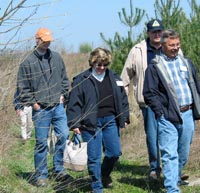Reforestation on Mined Lands Focus of Seven-State Partnership
Reforestation on Mined Lands Focus of Seven-State Partnership

Kentucky already has a long-standing and respected hardwood industry, but a recent seven-state initiative to reforest coal-mined lands could add many environmental and economic benefits.
Representatives of the U.S. Office of Surface Mining, U.S Forest Service, U.S. Department of Energy, the coal industry, environmental organizations, land companies, academia and the seven Appalachian coal mining states of Kentucky, Maryland, Ohio and Pennsylvania, Tennessee, Virginia and West Virginia have joined together to form the Appalachian Regional Reforestation Initiative.
Kentucky has been experimenting with reforestation in a number of locations for many years. Since 1997 the University of Kentucky College of Agriculture in cooperation with the Kentucky Surface Mining Regulatory Program has been conducting reforestation research on surface mines particularly on what was once the Starfire mine in eastern Kentucky. Retired Chair of UK’s Department of Forestry Don Graves has been involved with reforestation projects for more than 30 years.
“If we get surface mines back into production, we’ll have economic return from wood production on the mines again,” he said. “We’ll have recreation, wildlife, tourism, good water, better air, all those things.”
Some specific environmental benefits of reforestation include diverse plant species, enhanced wildlife habitats, soil and water conservation, water quality improvement and carbon sequestration. Some specific economic benefits are increased timber value, landowner tax reductions, enhanced recreational opportunities, jobs for local economies and local tax revenue.
“In Kentucky we have literally hundreds of thousands of acres out of production,” Graves said. “All the mining was right in the heart of the forested areas of the state. As a forester I may be biased, but I don’t believe people want to see grassland that is predominantly of fescue and serecia lespedeza. I think to reforest these areas will only help out the hardwood industry, and the state as a whole, over time.”
The success of the ARRI will depend on collaboration among all the involved parties, including sharing research. Many other states involved may initially look to Kentucky to get the ball rolling.
“Kentucky is at the forefront in all of this,” Graves said. “It became a national incentive by OSM, which is good because it’s the federal regulation agency for surface mining. It’s a great joint venture with state, federal and academic organizations. We’re going to try to share in research and complement each other in what we’re doing to try to make this successful.”
An objective of ARRI is to work with federal, state and local governments, mining companies, environmental groups, universities and other organizations to identify landowners and mining companies that will use the Forest Reclamation Approach. FRA is a five-step reclamation process that has been proven by forestry research to increase tree survival and productivity.
Current research at UK includes the planting of 3,000 acres of trees around the state.
“We hope we’ll be able to use these areas as outdoor classrooms to show people what can be done,” Graves said.
ARRI will provide a forum to transfer technology and other information concerning the creation of highly productive forestland and related environmental assets and cooperate as a clearinghouse to share data and information related to FRA technology. Periodic reports will describe the initiative’s status, successes and increased productive tree-planting efforts.